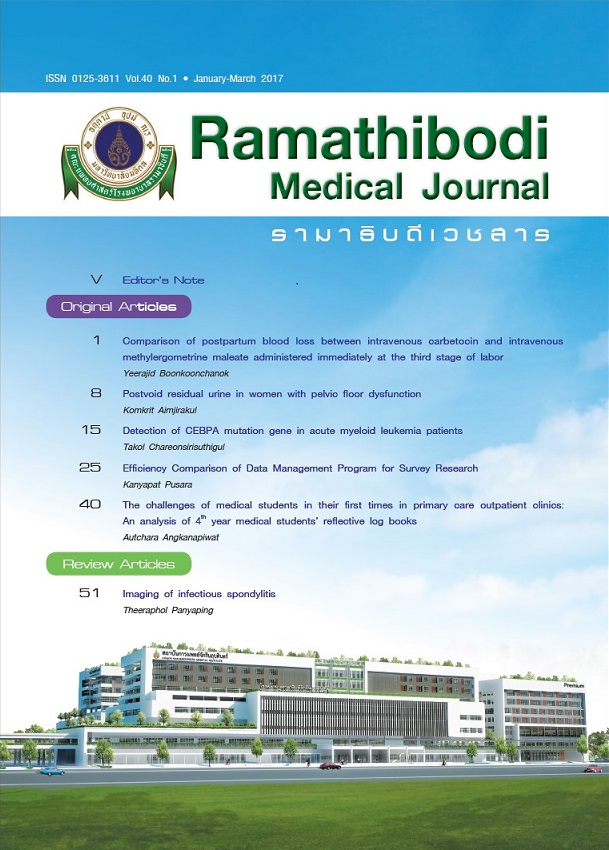Comparison of Postpartum Blood Loss Between Intravenous Carbetocin and Intravenous Methylergometrine Maleate Administered Immediately at the Third Stage of Labor
Main Article Content
Abstract
Background: Postpartum hemorrhage (PPH) is a major cause of maternal death and is accounted for 25% of maternal deaths worldwide. Nowadays, administration of uterotonic drugs to stimulate uterine contraction can prevent postpartum hemorrhage.
Objective: To compare postpartum blood loss and side effects between use of intravenous carbetocin and intravenous methylergometrine maleate administered immediately after child birth.
Methods: This quasi experimental study applied purposive sampling of 64 parturients. They were divided into 2 groups of 32 cases each who received either intravenous carbetocin or intravenous methylergometrine maleate during the third stage of labor. All parturients were managed during first and second stage of labor in the same way according to the principle of active management of labor. Outcome measures were the postpartum blood loss, duration of third stage of labor, side effects of drug and complications after delivery. Descriptive statistics included percent, mean and standard deviation. Chi-square test, Fisher’s exact test and Mann-Whitney U test were applied to test hypothesis with the significant level at P<0.05.
Result: There was no significant difference in demographic characteristics, duration of first, second and third stage of labor and birth weight between the two groups. Rate of PPH, side effect of drugs and complication during delivery were comparable between both groups. But the parturients who received carbetocin intravenously had less mean blood loss, slower pulse rate, lower diastolic blood pressure and lower systolic blood pressure than parturients who received methylergometrine maleate.
Conclusion: Intravenous carbetocin administered immediately after childbirth were more effective than intravenous methylergometrine maleate in prevention of postpartum blood loss among parturients of normal vaginal delivery. There were significantly less mean blood loss, slower pulse rate, lower diastolic blood pressure and lower systolic blood pressure among parturients who received intravenous carbetocin after delivery compared to those who received intravenous methylergometrine maleate. Carbetocin is a more preferable drug in reduction of postpartum blood loss and more safety in side effects of drugs than methylergometrine maleate.
Article Details
References
Khan KS , Say L, Gulmezoglu AM, Van PF. WHO analysis of causes of maternal death: a systematic review. Lancet. 2006;367(9516):1066-74.
Rath W. Prevention of postpartum haemorrhage with the oxytocin analogue carbetocin. Euro J Obstet Gynecol Reprod Biol. 2009;147(1):15-20. doi:10.1016/j.ejogrb.2009.06.018
Gulmezoglu AM, Souza JP, Mathai M. WHO recommendations for the prevention andtreatment of postpartum haemorrhage. Geneva: Department of ReproductiveHealth and Research. World Health Organization. 2012.
Ngan L, Keong W, Martins R. Carbetocin versus a combination of oxytocin and ergometrine in control of postpartum blood loss. Int J Gynaecol Obstet. 2007:97(2):152-3.
Nirmala K, Zainuddin AA, Ghani NA, Zulkifli S, Jamil MA. Carbetocin versus syntometrine in prevention of post-partum hemorrhage following vaginal delivery. J Obstet Gynaecol Res. 2009;35(1):48-54. doi:10.1111/j.1447-0756.2008.00829.x.
Cunningham FG, Leveno KJ, Bloom SL, Hauth JC, Rouse DJ, Spong CY. Obstetrical Hemorrhage. In: Williums Obstetrics. 23rd ed. New York: McGraw Hill; 2010:760.
Moertl MG, Friedrich S, Kraschl J, Wadsack C, Lang U,Schlembach D. Haemodynamic effects of carbetocin and oxytocin given as intravenous bolus on women undergoing caesarean delivery: a randomised trial. BJOG. 2011;118(11):1349-56. doi:10.1111/j.1471-0528.2011.03022.x.
Su LL, Rauff M, Chan YH, et al. Carbetocin versus syntometrine for the third stage of labour following vaginal delivery--a double-blind randomised controlled trial. BJOG. 2009;116(11):1461-6. doi:10.1111/j.1471-0528.2009.02226.x.
